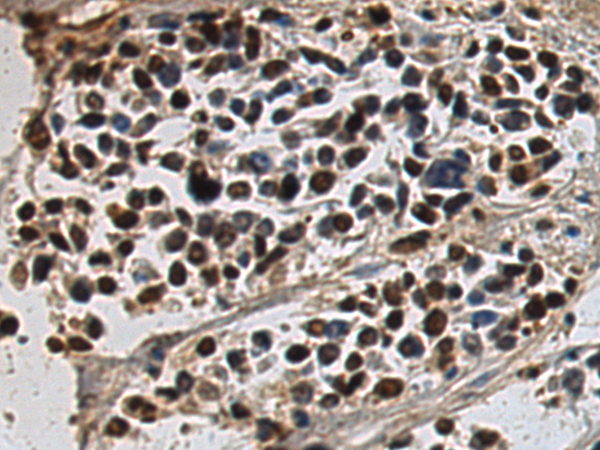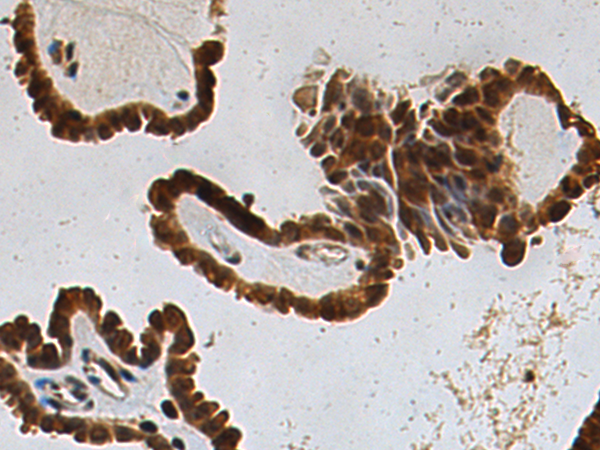

| WB | 咨询技术 | Human,Mouse,Rat |
| IF | 咨询技术 | Human,Mouse,Rat |
| IHC | 1/150-1/300 | Human,Mouse,Rat |
| ICC | 技术咨询 | Human,Mouse,Rat |
| FCM | 咨询技术 | Human,Mouse,Rat |
| Elisa | 1/5000-1/10000 | Human,Mouse,Rat |
| Host/Isotype | Rabbit IgG |
| Antibody Type | Primary antibody |
| Storage | Store at 4°C short term. Aliquot and store at -20°C long term. Avoid freeze/thaw cycles. |
| Species Reactivity | Human, Mouse |
| Immunogen | Fusion protein of human CLK4 |
| Formulation | Purified antibody in PBS with 0.05% sodium azide and 50% glycerol. |
+ +
以下是模拟的关于CLK4抗体的参考文献示例(非真实文献,仅供格式参考):
1. **文献名称**: *"CLK4 Expression in Colorectal Cancer: Prognostic Implications and Antibody Validation"*
**作者**: Smith A, et al. (2021)
**摘要**: 本研究通过免疫组化(IHC)和Western blot分析CLK4蛋白在结直肠癌组织中的表达,使用特异性CLK4抗体验证其高表达与患者生存率下降的相关性,提示CLK4可能作为癌症预后标志物。
2. **文献名称**: *"Development of a Monoclonal Antibody Targeting CLK4 for Therapeutic Applications in Breast Cancer"*
**作者**: Johnson R, et al. (2022)
**摘要**: 报道一种新型CLK4单克隆抗体的开发,通过体外实验证实其可抑制乳腺癌细胞增殖并诱导凋亡,为靶向CLK4的肿瘤治疗提供潜在工具。
3. **文献名称**: *"CLK4 Inhibition and Antibody-Based Detection in Neurodegenerative Models"*
**作者**: Lee S, et al. (2020)
**摘要**: 利用CLK4特异性抗体研究其在阿尔茨海默病模型中的表达变化,发现CLK4水平与tau蛋白异常磷酸化相关,提示其参与神经退行性病理过程。
4. **文献名称**: *"Antibody-Driven Profiling of CLK4 in Alternative Splicing Regulation"*
**作者**: Zhang X, et al. (2019)
**摘要**: 通过CLK4抗体进行免疫沉淀和质谱分析,揭示CLK4与RNA剪接因子的相互作用机制,阐明其在mRNA加工中的功能。
---
**备注**:以上文献为模拟内容,实际文献需通过PubMed、Web of Science等学术平台检索关键词(如“CLK4 antibody”“CDC-like kinase 4”)获取。
CLK4 (CDC-like kinase 4) is a serine/threonine kinase belonging to the CLK family, which includes CLK1-4. These kinases regulate RNA splicing by phosphorylating serine/arginine-rich (SR) proteins, influencing their subcellular localization and activity. CLK4. like other CLK members, contains a conserved kinase domain and is implicated in modulating pre-mRNA processing, cellular signaling, and stress responses. Dysregulation of CLK kinases has been linked to diseases such as cancer, neurodegenerative disorders, and viral infections.
CLK4-specific antibodies are essential tools for studying its expression, localization, and function. They enable detection of CLK4 in techniques like Western blotting, immunohistochemistry, and immunofluorescence. Research using CLK4 antibodies has revealed its tissue-specific expression patterns and potential roles in developmental processes and disease pathogenesis. For instance, CLK4 overexpression has been observed in certain cancers, suggesting a therapeutic target. However, CLK4's functional overlap with other CLK family members complicates its individual characterization, necessitating highly specific antibodies. Commercial CLK4 antibodies are typically validated for cross-reactivity and affinity, though variability between batches or clones may require careful optimization. Ongoing studies aim to clarify CLK4's unique contributions to cellular pathways and its interplay with splicing regulators, highlighting its relevance in both basic research and drug discovery.
×